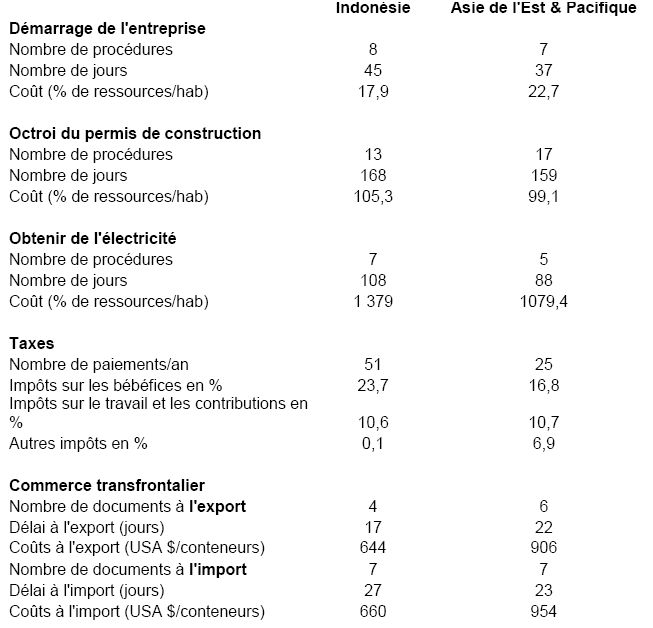Le secteur bancaire de l’Indonésie est devenu un aimant pour les entreprises étrangères, prêtes à accepter un environnement d’investissement incertain en retour d’une croissance en plein essor et d’un marché inexploité de dizaines de millions de clients potentiels. Les principaux acteurs regardent avec intérêt les résultats de DBS Group (Singapour) qui a acheté pour 7,3 milliards de dollars le 2 avril la Banque Danamon Indonesia, la cinquième plus grande banque du pays. Soulignant les incertitudes, la banque centrale a refusé d’approuver l’accord jusqu’à ce qu’il soit établit de nouvelles règles sur la propriété étrangère, qui permettent actuellement aux investisseurs locaux et étrangers de détenir jusqu’à 99% des banques indonésiennes. Un feu vert donnerait aux entreprises étrangères plus de confiance pour investir dans une économie qui a affiché une croissance de 6,5 pour cent l’an dernier. Les banques indonésiennes sont attrayantes car elles se développent beaucoup plus vite que les banques étrangères.
L’écart de croissance entre le secteur bancaire indonésien et les institutions occidentales qui luttent pour sortir de la crise de la dette devrait se creuser dans les décennies à venir, selon un rapport publié par PricewaterhouseCoopers (PwC). Les banques de l’Indonésie grandissent à un rythme phénoménal, beaucoup plus rapidement que dans l’Europe et les Etats-Unis, indique le rapport.
Les actifs bancaires de l’Indonésie devraient atteindre 5 100 milliards de dollars d’ici 2050 (187 milliards de dollars en 2009) une multiplication par 27. Au cours de la même période, les actifs américains ne seront multipliés que par 3.
L’offre de DBS pour Danamon est révélateur des plans des plus grandes banques d’aller puiser dans l’Asie émergente, car il ne peut plus croître organiquement en occident, où la pénétration du marché est déjà élevé. En revanche, seulement environ la moitié des Indonésiens de plus de 15 ans ont des comptes bancaires, laissant un marché inexploité d’environ 60 millions de personnes dont beaucoup maintenant vont se joindre à la classe moyenne et auront besoin de services financiers. L’intérêt international a été stimulé par un certain nombre de facteurs, notamment les lois indulgentes relatives à la propriété étrangère qui ont été introduites pour stimuler l’investissement après la crise financière asiatique de 1997-1998.
Le marasme de l’économie de l’Ouest ont rendus les économies régionales, comme l’Indonésie, encore plus attrayantes, et a incité les investisseurs à réévaluer le ratio gain/risque (posés par la législation opaque et la corruption généralisée). La confiance des investisseurs a également été renforcée ces derniers mois depuis que l’agence de notation Moody & Fitch a fait remonter les notes de l’Indonésie.
L’accord de DBS serait la plus grande acquisition de banque de l’histoire de l’Indonésie, mais d’autres investisseurs étrangers ont également fait des incursions. Commonwealth Bank Australie a annoncé l’année dernière qu’il voulait doubler le nombre de filiales en Indonésie (de 80 à 150) au cours des prochaines années.
L’opposition à l’accord Danamon est l’écho d’une récente flambée nationaliste sur l’industrie minière, ce qui a incité le parlement à adopter une loi en Février plafonnant la propriété étrangère à 49% après 10 ans de production. Il est possible que le plafond de participation soit également descendu pour les banques, ce qui a alimenté l’incertitude sur l’environnement réglementaire du secteur.
Bibliographie :
http://www.lepoint.fr/monde/les-etrangers-au-guichet-des-banques-indonesiennes-22-05-2012-1463998_24.php
http://www.gbgindonesia.com/en/finance/article/2011/opportunities_in_indonesia_s_banking_industry.php
Cliquer pour accéder à PwCIndonesia-Banking_Survey_Report_2011.pdf

